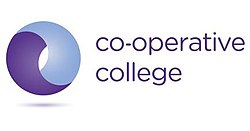Co-operative College
From Wikipedia, the free encyclopedia
Co-operative College is a UK educational charity dedicated to the promotion of co-operative values, ideas and principles within co-operatives, communities and society.
 | |
| Company type | Charity |
|---|---|
| Industry | Education |
| Founded | 1919 |
| Headquarters | , |
Area served | UK nationwide and international |
Key people | Jacqui Thomasen CEO, Ali Longden Principal |
| Revenue | See https://www.co-op.ac.uk/annual-report for up to date figures |
Number of employees | 12 |
| Website | co-op.ac.uk |
Origins and development
Summarize
Perspective

The Co-operative College is an educational charity working throughout the UK and internationally to help make the world a more co-operative place.
They bring over 100 years’ experience to their work, delivering a range of values-based training, learning and development opportunities, and projects to empower organisations, communities, young people, and individuals to make positive change through co-operation.
The Co-operative College was established in 1919 by the Co-operative Union with ten overseas students based on the second floor of Holyoake House, Manchester, and in 1943 the College became a charitable trust.
In 1945, Holyoake House was damaged by a blitz, and the Co-operative College was forced to relocate to Stanford Hall, near Loughborough, where it spent almost fifty years. Along the years that the College spent in Stanford, it ran residential courses in social/economic subjects for adult learners and a wide range of retail and management courses for co-operative employees.
The College now operates as a remote working organisation, but retains an office in its original home at Holyoake House. Jacqui Thomasen is Chief Executive and Ali Longden is Principal.
Key areas of work

- Co-operative learning and development
- International co-operative development
- Co-operative study tours to Greater Manchester
- Youth empowerment
See also
References
External links
Wikiwand - on
Seamless Wikipedia browsing. On steroids.
